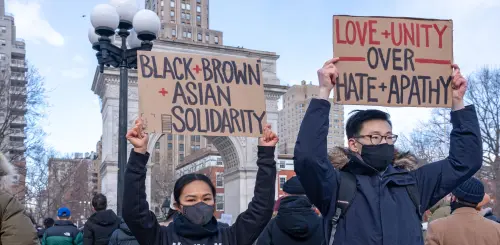To maintain a simple good vs. evil framework, the fact that Ukraine's neo-fascist movement had a significant role in the opposition to Yanukovych--and the government that replaced him--was downplayed or even outright denied.

fair.org
Holy propaganda, Batman!
I mean, seriously, for an organization that is literally named "Fairness & Accuracy In Reporting, Inc", that article certainly has more than its "fair" share of (not exactly subtle) editorializing of events to create a narrative.
Let's break down a few key examples:
FAIR article said:
historian's article quoted by FAIR said:
the message from authoritarian regimes in Moscow and Kiev was not so different from some of what was written during the uprising in the English-speaking world, especially in publications of the far left and the far right. From Lyndon LaRouche’s Executive Intelligence Review through Ron Paul’s newsletter through The Nation and the Guardian, the story was essentially the same: little of the factual history of the protests, but instead a play on the idea of a nationalist, fascist or even Nazi coup d’état.
In other words, not only Russian and ex-Ukrainian officials, but also various Western media outlets—with the most oddball and marginal listed first—are putting forth the “propaganda” claim that Yanukovych was overthrown by the far right.
1. Regardless of the insinuations of the author, listing the EIR then Ron Paul's editorials is simply following how "far left" is given before "far right" in the preceding sentence. It's a
very, very basic literally technique to help prevent reader confusion.
2. Conflation of Ron Paul's
editorials with
news or even journalistic
articles in order to pretend that the quoted historian was criticizing the Guardian rather than RP's hot take.
FAIR article said:
Given this introduction, you would expect the article to go on to debunk the idea that the people who overthrew the Ukrainian government were fascists. Instead, Snyder spends the next 20 paragraphs arguing that Yanukovych’s government was bad and undemocratic. It need hardly be said, of course, that bad, undemocratic governments can have fascist opponents; if they could not, his opposition to Stalin would disqualify Hitler as a fascist.
So it isn’t until the 23rd paragraph that Snyder begins to address the claims made by “the far left and the far right” about fascists overthrowing Yanukovych.
So this entire paragraph (and a sentence) is straight up misinformation (conveniently easy for FAIR to debunk this historian when they just make up what he said...). Below are the
3rd and
4th paragraphs of the historian's article where he clearly already begins laying out the case that the revolution was a "popular" one (ie:
not just fascists, but a broad spectrum of the entire population). Unfortunately, the article itself is paywalled, but even this small excerpt is enough to disprove that it takes until the "23rd paragraph."
https://www.nybooks.com/daily/2014/03/01/ukraine-haze-propaganda/ said:
In fact, it was a classic popular revolution. It began with an unmistakably reactionary regime. A leader sought to gather all power, political as well as financial, in his own hands. This leader came to power in democratic elections, to be sure, but then altered the system from within. For example, the leader had been a common criminal: a rapist and a thief. He found a judge who was willing to misplace documents related to his case. That judge then became the chief justice of the Supreme Court. There were no constitutional objections, subsequently, when the leader asserted ever more power for his presidency.
In power, this leader, this president, remained a thief, but now on a grand, perhaps even unsurpassed, scale. Throughout his country millions of small businessmen and businesswomen found it impossible to keep their firms afloat, thanks to the arbitrary demands of tax authorities. Their profits were taken by the state, and the autonomy that those profits might have given them were denied. Workers in the factories and mines had no means whatsoever of expression their own distress, since any attempt at a strike or even at labor organization would simply have led to their dismissal.
FAIR article said:
And he starts, surprisingly enough, by acknowledging that there’s an element of truth to them: “The Ukrainian far right did play an important part in the revolution,” he writes. That’s maybe something he could have mentioned some 1,800 words earlier; it seems an important qualifier to the assertion that talk of “right-wing extremists” is mere “propaganda.”
1. The FAIR author is intent on misrepresenting the opposing argument. It's not that "there were no fascists or far right involved in the revolution", rather it's that "fascists or the far right did not make up the entirety, majority, or even plurality of the revolution."
2. The FAIR author, again, complains about how the historian should have mentioned
some fascists participating earlier, but, as shown by the quote above,
the historian did, just implicitly. It was a "popular" revolution. If the overall populace of Ukraine included a portion of fascists, then they would obviously be involved in a popular uprising against a non-fascist government.
So that's roughly the first 3rd or so of this nonsense and it's already taken me quite a bit of time to put this post together (and I suspect the forums would break if I added much more). The rest of it is
slightly more sourced, but the above is still representative of the whole. So much for "fairness" and "accuracy"...




